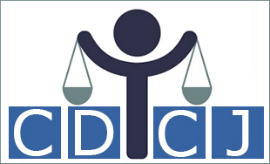The European Committee on Legal Co-operation (CDCJ) has worked on a number of new recommendations and guidelines in recent years. We would like to discuss with you the guidelines on the efficiency and the effectiveness of legal aid schemes in the areas of civil and administrative law that the Committee of Ministers of the Council of Europe adopted on 31 March 2021. Could you tell us why the Committee decided to embark on developing these guidelines and the reasons behind this decision?
There were a number of reasons, the most important being the significance of access to effective legal aid and assistance, that should not be denied to those who do not have the financial means and cannot afford a lawyer. There was a need to further explore this issue in the context of the civil and administrative justice systems and give more substantial guidance to member states wishing to improve or strengthen the legal aid schemes in place. Legal aid is a critical component to ensuring access to justice and particularly has a prominent role in the criminal law context. Therefore, relevant European legal instruments have been already established for quite some time, unlike in areas of civil and administrative law. The right to legal aid at all stages of the criminal process is a fundamental procedural right for all those accused or suspected of crime and all member states safeguard this right to legal representation for all vulnerable persons using the criminal justice system. However, most international standards limit this right to legal aid (often referred to as legal assistance), to legal advice, assistance and representation in court proceedings or otherwise related to litigation, particularly in the context of criminal matters. This is the case of Article 6 of the European Convention on Human Rights. However, the Committee of Ministers of the Council of Europe, in its Resolution (78) 8 (on Legal Aid and Advice), recommends Council of Europe member states to ensure that persons in an economically weak position are able to obtain necessary legal advice on civil, commercial, administrative, social or fiscal matters and that such advice should be free or subject to a contribution based on their resources. In its Recommendation No. R (93) 1 (on Effective Access to the Law and to Justice for the Very Poor) the Committee of Ministers invites Council of Europe member states to promote legal services for the poor by defraying the cost of legal advice through legal aid schemes, developing advice centres in underprivileged areas, and by enabling NGOs or voluntary organisations providing support to the very poor, to give legal assistance.
Why are these guidelines unique?
The answer to this question lies in what I have just mentioned – before these guidelines were developed by the CDCJ, no other international legal instrument addressed the principles and issues relating to legal aid schemes in civil and administrative law, either at European or international level. The principles and standards of legal aid in the criminal justice system are inherited from the European Convention on Human Rights and European Court of Human Rights case law, and are also outlined in the International Covenant on Civil and Political Rights, the UN Human Rights Committee, the UN Principles and Guidelines on Access to Legal Aid in Criminal Justice Systems, the European Committee for the Prevention of Torture, and the UN Subcommittee on Prevention of Torture. However, the legal aid schemes in civil and administrative law standards are poorly covered. In addition to what was already mentioned, there are two European Union legal instruments relevant in this context, firstly on legal aid for cross-border disputes - the Legal Aid Directive (Directive 2002/8/EC of 27 January 2003 to improve access to justice in cross-border disputes by establishing minimum common rules relating to legal aid for such disputes, OJ L 26, 31 January 2003), and on mediation - the Mediation Directive (Directive 2008/52/EC of 21 May 2008 on certain aspects of mediation in civil and commercial matters, OJ L 136, 24 May 2008). Thus, for the Committee it was equally important to address this evident need and gap by developing the relevant legal instrument. The adoption of the guidelines is a significant step forward and a strong catalyst in promoting the commitment of the Council of Europe to legal aid issues and supporting member states towards implementing UNSDG Goal 16: peace, justice and strong institutions.
What aspects of legal aid scheme do you consider as the most important? To which aspects should member States considering improving the efficiency of their legal aid schemes pay attention to according the guidelines?
The answer to this question lies in the article on the topic provided in this newsletter which explains in more detail the merging trends and new challenges that deserve more attention from policy makers wishing to reform the legal aid schemes in place or wishing just to develop the system. However, both from the research conducted by the Committee before embarking on the development of the guidelines, as well as the feedback from member States during working group’s discussions, it became apparent to me that without prompt access to legal aid at all stages of the criminal, civil or administrative justice process, a sufficiently staffed and resourced nationwide legal aid system, a diversity of legal aid providers including lawyers, university legal clinicians and paralegals, it would be impossible to build a viable and sustainable system. Member States should strive to design and implement innovative, comprehensive and sustainable legal aid systems, which are attainable and also with the assistance of IT technology being more affordable and widespread. Effective legal aid schemes produce significant positive outcomes both for individuals and for the wider society by improving the performance of the justice system at large and increase accountability and respect for the rule of law long term.
Now that there are new Council of Europe guidelines, what are the next steps for the member states? What are the challenges and what should be expected from the CDCJ in the future on this issue?
The guidelines are of an advisory nature, it is up to the member states to make use of the existing examples of good practices and of the interesting approaches already implemented. For the Committee, it is critical now that the member states are well informed and aware of the content of these guidelines and use them to improve their legal aid schemes, address gaps and obstacles, and adopt practical solutions suitable to their needs.
It is difficult to envisage now what could be the possible future challenges in this area. Certainly, it remains to be seen if and how the COVID-19 pandemic affected the provision of legal aid services. We can only speculate, as the economy and resources of all member states are strained, and as previous experience has shown, it is often the legal aid systems that suffer the drastic budget cuts when such global events occur. If the issues and cases leading to homelessness or debt escalate and increase, access and availability to preliminary, early legal advice becomes paramount.
The CDCJ and the Council of Europe can provide support through their co-operation projects and bilateral guidance for reforming national legal aid systems. The Committee periodically revisits the state of implementation of its instruments, including these guidelines, and will continue to document best practices and follow the developments in legal aid schemes in civil and administrative law areas.




